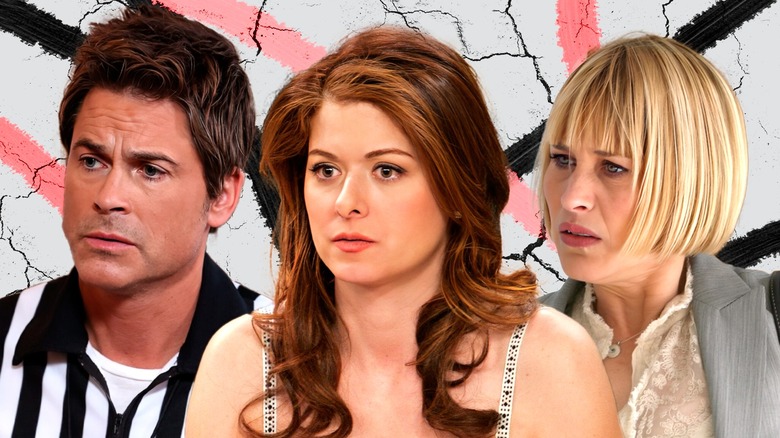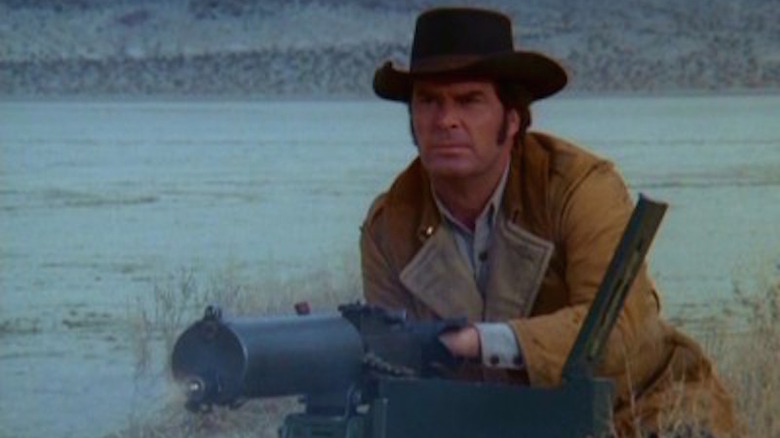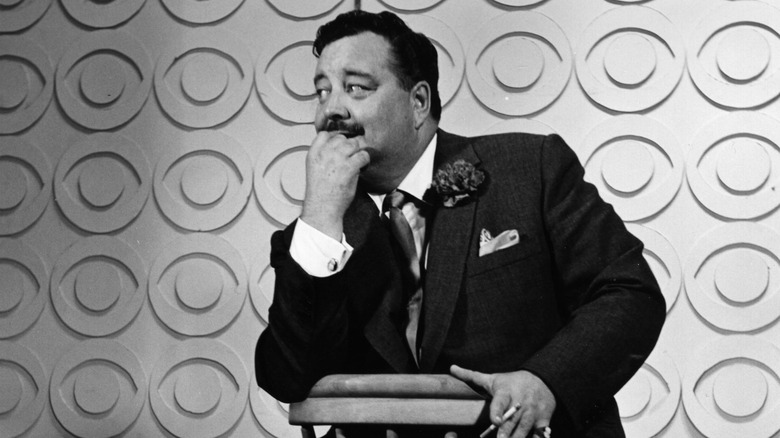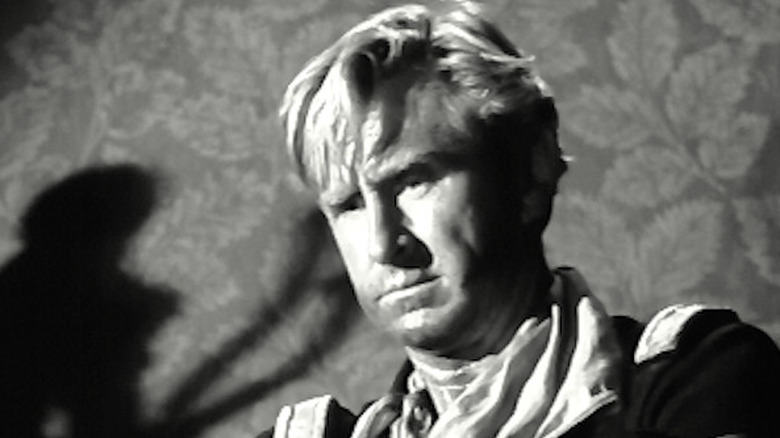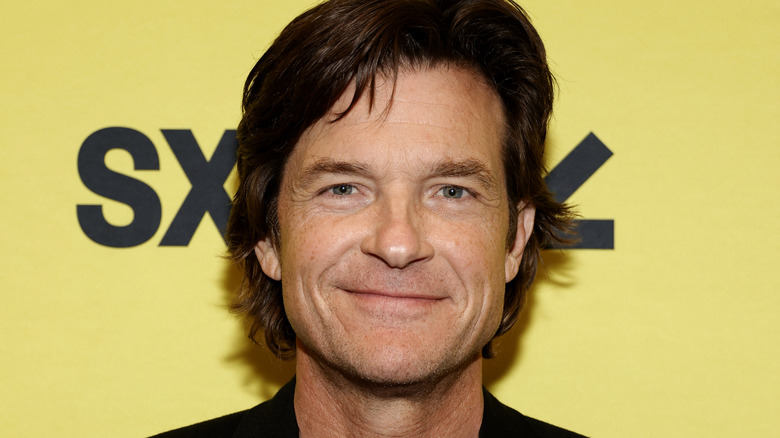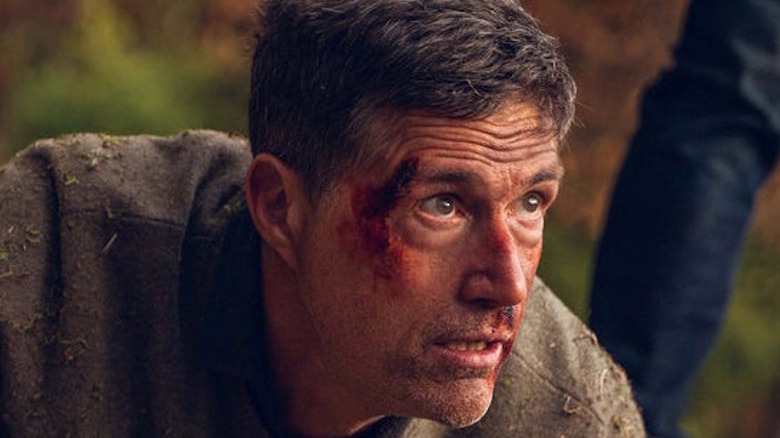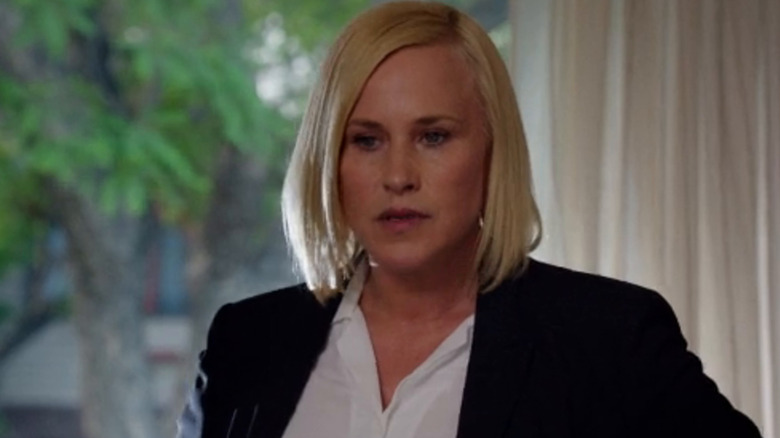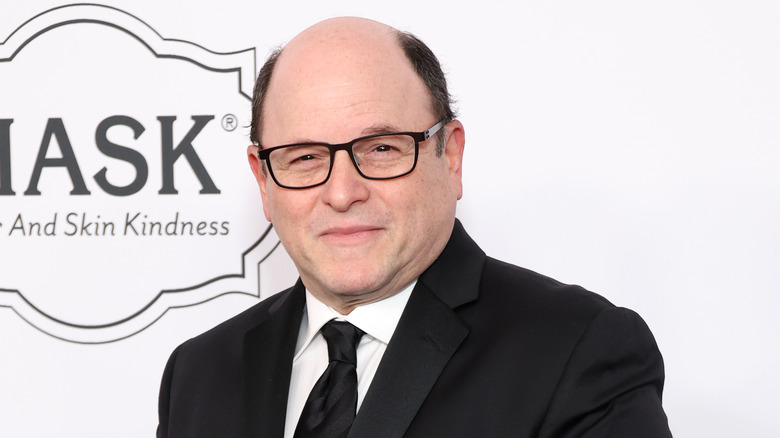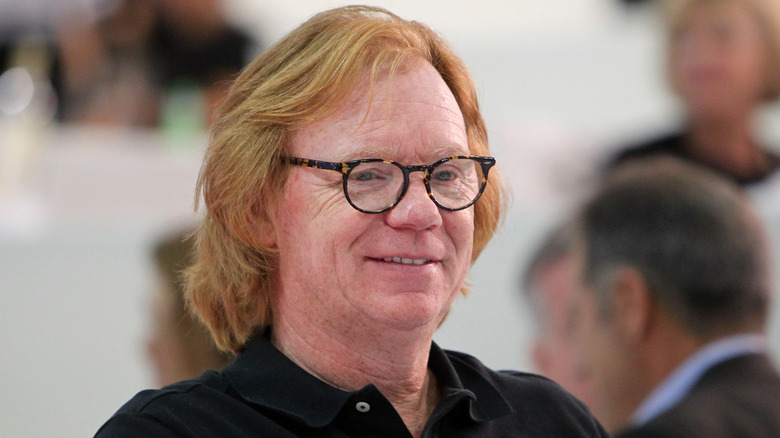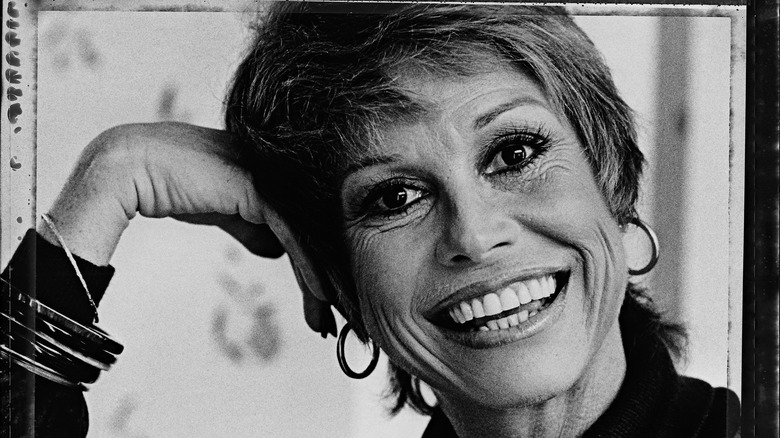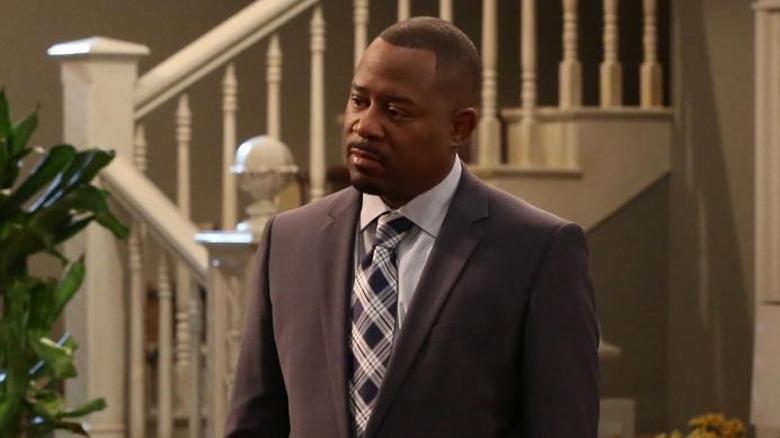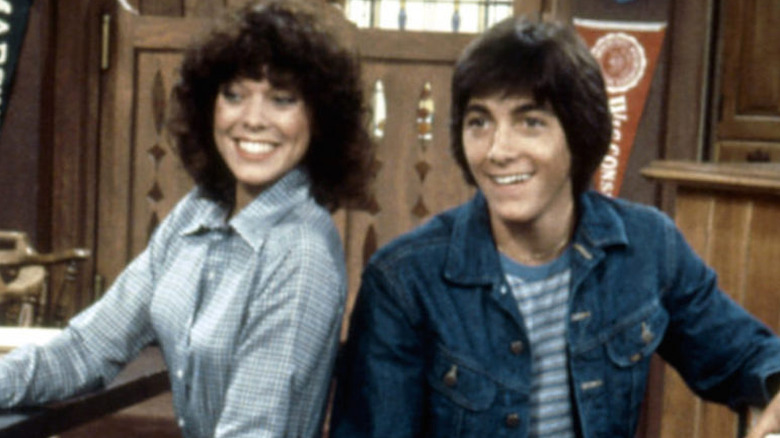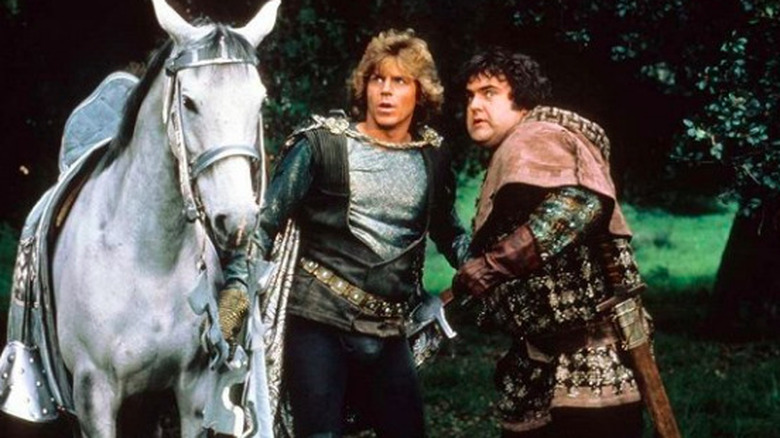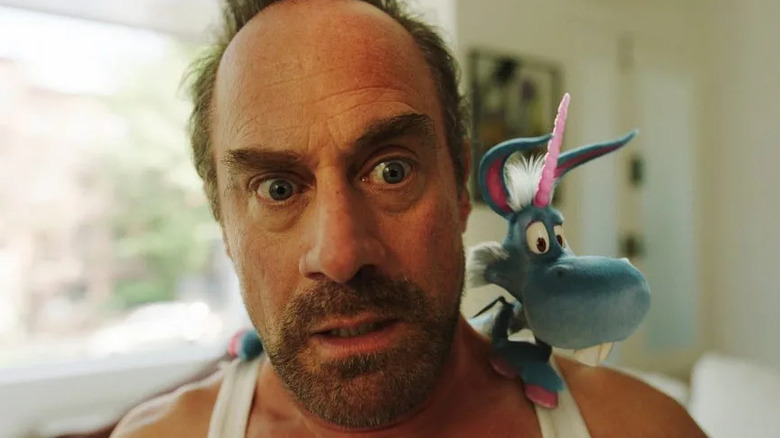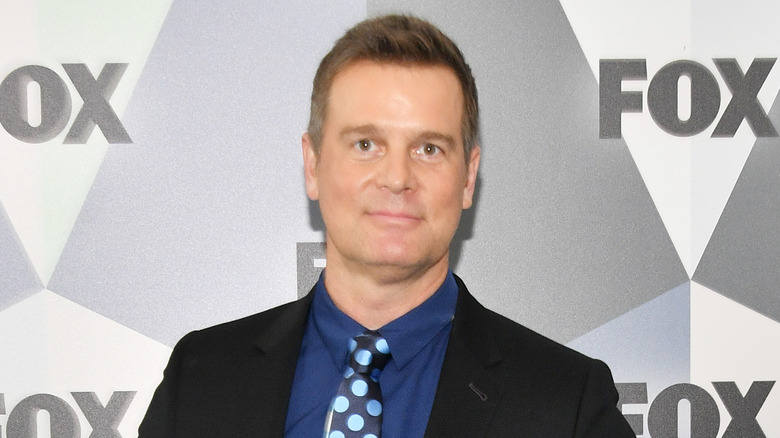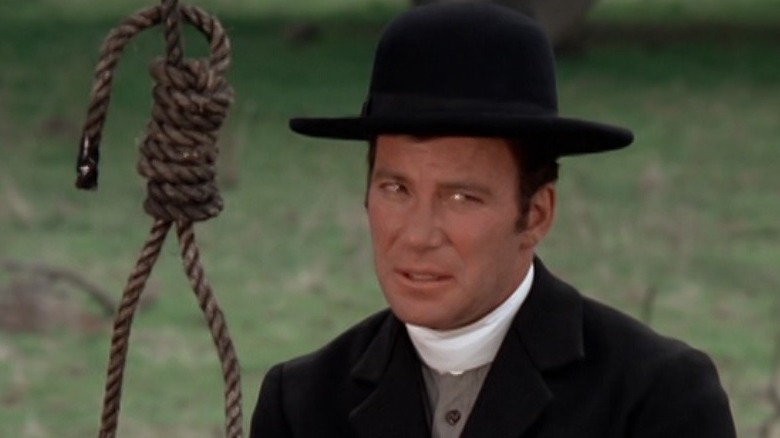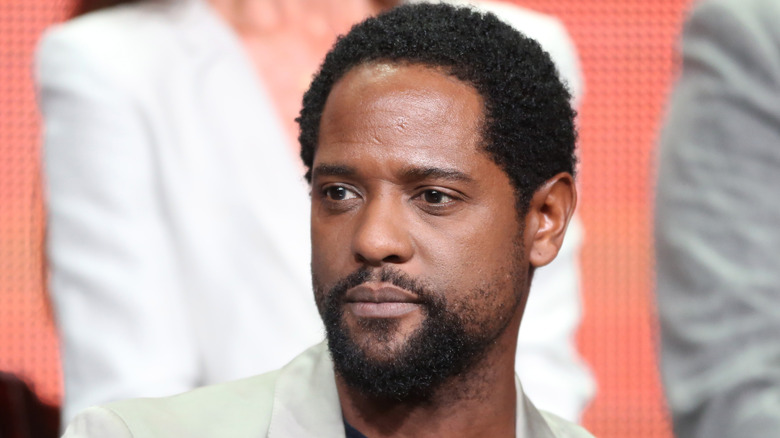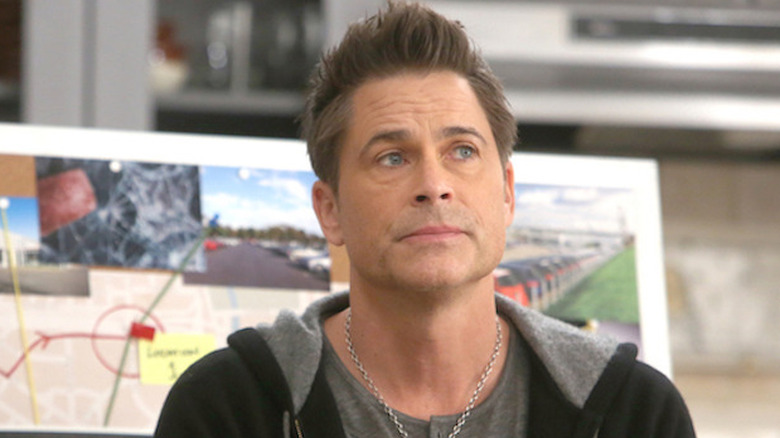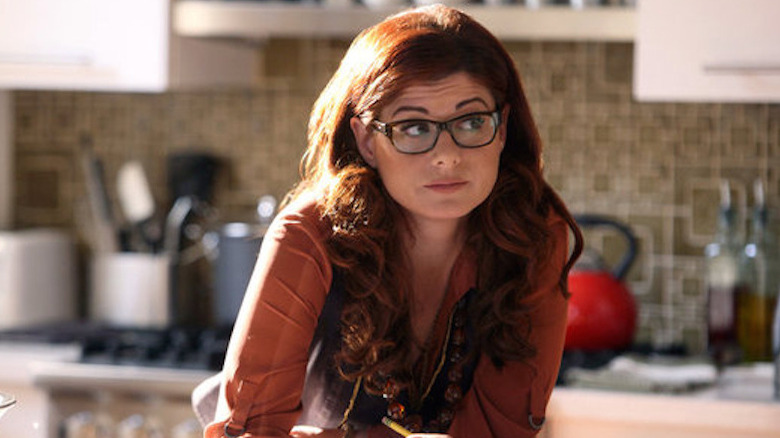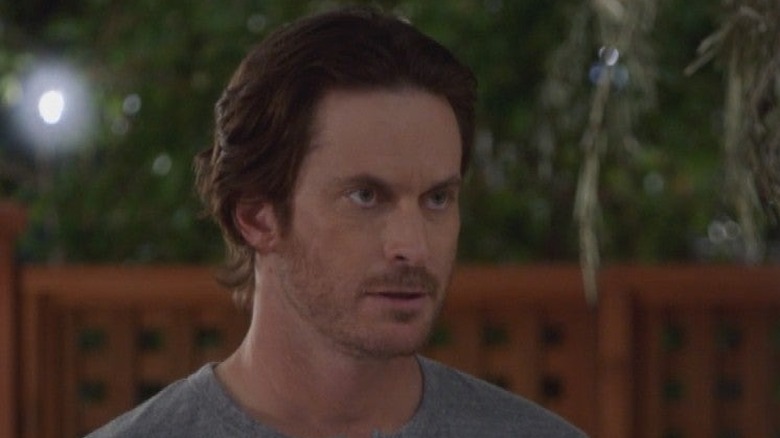Actors Who Followed A Hit Series With A Huge Flop
A mix of success and failure is part and parcel of any career, including acting. The list of actors in any medium who have scored nothing but hits is most likely non-existent; every actor, at some point, has a flop or two (or more) on their resume. For some, the failed project is a chance to reassess their career path and try a different approach, while for others, it's the beginning of a fallow period before a (hopeful) comeback.
This applies to film and television actors alike – Ted Danson treaded water after "Cheers" until "Damages" and "The Good Place" allowed him to reinvent himself as a talented character player; his co-star, Kelsey Grammer, followed "Cheers" with the long-running "Frasier," but found himself unable to repeat its success despite numerous tries, and is now working on a "Frasier" reboot.
Dozens of TV stars who climbed the heights of small screen success followed their hit with failure, and in some cases, multiple failures. They include Emmy winners, box office draws, and beloved figures. The following is a list of actors who soared with a hit series, only to plunge into failure with its follow-up.
James Garner
Though "Maverick," netted James Garner a hit series, an Emmy nomination, and a path to movie stardom in films like "The Great Escape," he parted ways with the show's studio, Warner Bros., over a contract dispute in 1960 and stayed far afield from TV for the rest of the decade. But in 1971, they mended fences and reunited for a second Western series, "Nichols."
Created by Oscar-winning screenwriter, Frank Pierson, and debuting on NBC in 1971, "Nichols" signaled a new kind of Western by setting the action in 1914 and highlighting how industrialization had ended the American Old West. Garner's Nichols is an army veteran who leaves the military and rides a motorcycle instead of a horse to his new life in his hometown. There, he runs afoul of a powerful family that presses him into becoming sheriff.
Despite Garner's charm and the presence of Margot Kidder as his love interest and Stuart Margolin — who played Angel in Garner'sfollowing series, "The Rockford Files" — "Nichols" suffered from low ratings and flagging support from Warner. As series executive producer, Meta Rosenberg (who was also Garner's agent), told the Television Academy, the studio disliked that Nichols was neither a hero nor a smooth character like Bret Maverick. In an effort to retool the series, Nichols was killed off in the season finale, only to be replaced by Garner as his identical (but ostensibly different) twin brother. NBC and Warner refused the new approach and axed the series in 1972.
Jackie Gleason
Jackie Gleason had delivered consistently high ratings for CBS for nearly a decade as the host and star of the variety series, "The Jackie Gleason Show," which also generated his enduring sitcom, "The Honeymooners." It seemed reasonable that the network would regard his next project — as host of a game show called "You're in the Picture" — as another hit in the making. But when the program premiered on January 20, 1961, CBS found themselves with one of the biggest failures in television history.
The show featured a celebrity panel and asked them to view a life-sized illustration that depicted a scene or idea. The panel was also asked to stick their heads through holes cut out in the pictures while asking Gleason questions; those that correctly guessed the idea or phrase were rewarded with 100 CARE packages donated in their name. If no one guessed correctly, the packages would be donated in Gleason's name.
The sight of the hapless celebs' faces in the cartoonish pics undoubtedly contributed to the blistering reviews for "Picture," and Gleason personally addressed the response in its second episode, for which he took center stage and issued a riotous episode-long apology for the show. Gleason also took responsibility for the show's disastrous premiere while also singling out the hard work of the crew. His one-man mea culpa earned a stellar response from the press, and he completed his commitment to CBS by turning the remaining eight episodes into "The Jackie Gleason Show."
Lloyd Bridges
After working tirelessly in independent and studio features and on live television, two-time Emmy-nominated actor Lloyd Bridges finally found stardom in 1958 as the lead in "Sea Hunt," a hugely popular syndicated series about the underwater adventures of a former Navy diver. After "Sea Hunt" made its final voyage in 1961, Bridges returned to guest roles in episodic series and made-for-TV features before returning to series work with his own eponymous anthology series in 1962.
"The Lloyd Bridges Show" gave the actor two opportunities to flex his talents per episode: he played roving reporter Adam Shepherd, who served as the show's host and narrator, and also played a different character in each episode. Despite notable guest stars like John Cassavetes and Gena Rowlands — and early appearances by Bridges' sons, Jeff and Beau — the series only lasted a single season.
The same fate befell his next series, "The Loner," which aired on CBS from 1965 to 1966. The Western drama, which starred Bridges as a veteran traversing the United States after the Civil War, also marked Rod Serling's highly anticipated return to series television after the cancellation of "The Twilight Zone" in 1964. Despite its pedigree, "The Loner" was deemed, in the words of TV Guide critic Cleveland Amory, "either too real for a public grown used to the unreal Western or too adult for juvenile Easterners," and canceled by the network after just 26 episodes.
Jason Bateman
Jason Bateman has enjoyed such a long and diverse career — as both an Emmy-nominated comic actor and dramatic player, as well as producer, Emmy-winning director, and podcaster — that one might forget that he was a juvenile actor on television in the 1980s. Bateman began his career in "Little House on the Prairie" before rising to stardom as Ricky Schroeder's wiseguy friend in "Silver Spoons" and as the eldest son in "The Hogan Family." But Bateman also appeared in a long list of sitcoms that generated far less enthusiastic responses from viewers.
Taking note of his popularity in "Spoons," NBC gave Bateman his own sitcom, "It's Your Move," during the 1984-1985 season. The comedy, about a scheming high schooler, disappeared after 18 episodes. He returned to series work in 1995 with "Simon," which cast him as a former stockbroker who moves in with his brother (Harland Williams). The WB sitcom was yanked after 21 episodes, and Bateman moved to CBS for "George and Leo."
Bateman briefly remained at CBS for "Some of My Best Friends," which starred Bateman and Danny Nucci as gay and straight (respectively) roommates. Only five episodes were aired before its cancelation, and Bateman's next series, "The Jake Effect," issued just seven episodes before NBC pulled the plug. It's worth noting that his next sitcom, and the project that revived his career, "Arrested Development," was also a disappointment, remaining in the lower reaches of the ratings during its initial three seasons.
Matthew Fox
Matthew Fox enjoyed a double dose of TV success in the 1990s and 2000s with two hits: Fox's "Party of Five," which debuted to modest ratings in 1994 but slowly built an audience over its next four seasons, and "Lost," which remained a ratings juggernaut over its entire six-season run and netted him Emmy and Golden Globe nominations. Fox declared himself done with television after the latter series reached its conclusion in 2010, and focused on a film career.
However, after a string of minor hits ("Vantage Point"), cult favorites ("Bone Tomahawk"), and outright flops ("Speed Racer," "Alex Cross"), Fox reversed his previous decision and returned to TV after a seven-year absence for the 2022 Peacock miniseries, "Last Light." Fox served as both star and executive producer for the science fiction show, which was adapted from the novel of the same name by Alex Scarrow.
"Last Light" imagines the global chaos caused by an environmental terrorist attack on the world's oil supply, and Fox spends much of his screen time trying to determine the source of the attack while also recovering his family from far-flung locations across the globe. Reviews of "Last Light" were almost as apocalyptic as its scenario, with The Hollywood Reporter calling it "inept" and Paste labeling it a "dud."
Patricia Arquette
Patricia Arquette's first go-round as a TV series lead with the supernatural drama, "Medium," was a viewer favorite, airing for seven seasons on CBS and NBC, as well as a professional success for the actress, who earned two Emmy nominations (winning one) and three Golden Globe nods for her performance. After adding an Oscar to her list of laurels for her turn in 2014's "Boyhood," Arquette returned to television the following year to top-bill "CSI: Cyber," the fourth series in the long-running "CSI" crime series franchise.
In the series, Arquette plays a behavioral scientist tapped to lead a team of FBI agents investigating an array of crimes involving computers or online behaviors. Despite the "CSI" name and basic format of a diverse team tackling seemingly unsolvable cases, the series did not generate the same degree of audience and critical support as its predecessors. Ted Danson was brought aboard to reprise his "Crime Scene Investigation" character, D.B. Russell, in Season 2, but that gambit failed; CBS canceled "Cyber" for good at the end of its second season in 2016. Arquette later returned to TV for the 2022 Apple+ series, "Severance."
Jason Alexander
Of the four "Seinfeld" leads, Julia Louis-Dreyfus and Jason Alexander have mounted the most attempts to establish their own tenure as series stars (Jerry Seinfeld has waved off any suggestion of returning to TV, while Michael Richards remains in self-imposed exile). And while Louis-Dreyfus hasn't scored a series that registered on the zeitgeist scale like "Seinfeld," her work in "Veep" and "The New Adventures of Old Christine" has received audience and critical praise. Alexander has been an in-demand guest and recurring star in series like "The Marvelous Mrs. Maisel," "Young Sheldon," and "Everybody Hates Chris," but as a lead, he's yet to find the right vehicle.
Alexander's first star turn following the end of "Seinfeld" was in ABC"s "Bob Patterson," which follows a motivational speaker whose home and personal lives are anything but inspiring. The network aired only five of its 10 episodes in 2001, though the series helped inspire Alexander's comic one-man show, "Donny Clay — America's #4 Self-Help Guru." He then moved to CBS for "Listen Up," a sitcom in which he plays a sports show host, but middling reviews led to its early demise after a single season; Alexander's final series lead to date came in 2017 with "Hit the Road" about a dysfunctional family band. The Audience Network comedy also earned mediocre reviews and was unceremoniously dumped after a single season.
David Caruso
For many TV fans and observers — as well as a few producers and executives at ABC — David Caruso defined the word "schadenfreude" (the enjoyment gained from watching someone's misfortune) when he left the TV drama, "NYPD Blue," for a career in the movies that imploded in spectacular fashion. After a trio of back-to-back flops ("Kiss of Death," "Jade," and "Cold Around the Heart"), Caruso returned to television, this time working for CBS in a legal drama called "Michael Hayes." Caruso played the title role, a former cop turned acting U.S. attorney for New York's Southern District.
Paired with a roster of impressive character actors, including the late Philip Baker Hall, and a wealth of criminal cases that need his special brand of intense, soul-searching heroism, Caruso underscored that he could be a compelling leading man in a small-screen drama. Unfortunately, CBS dropped the series into the unenviable 10 p.m. time slot against heavyweights like "Frasier" and "Home Improvement," all of which contributed to its demise after a single season. Caruso found his comeback project two years later with "CSI: Miami," which ran for an impressive 10 seasons.
Mary Tyler Moore
Listed on the Writers Guild of America's 101 Best Written TV Series of All Time, "The Mary Tyler Moore Show" reaped 29 Emmy Awards, including three apiece for the series and for Moore, and the show paved the way for other programs anchored around smart, independent women who wanted more than just a significant other. But it also cast a long shadow over nearly all of Moore's subsequent TV projects, which inevitably failed to live up to its high standards.
When the show came to an end in 1977, CBS lured Moore back the following year with "Mary," a variety series produced by her own company, MTM Enterprises. Despite a wealth of up-and-coming talent, including early appearances by David Letterman and Michael Keaton, "Mary" was pulled after just three episodes. Keaton and Letterman would return for its immediate follow-up, "The Mary Tyler Moore Hour," which took the curious approach of delivering a variety program within a sitcom storyline: Moore played the star of a fictional variety series not unlike "Mary."
It too struggled to find a following and disappeared after 11 episodes. Moore adopted a straight-ahead sitcom format for 1986's "Mary," which wore its connection to "The Mary Tyler Moore Show" on its sleeve with its newsroom setting, but it was gone after 13 episodes. 1988's "Annie McGuire" lasted just 11 episodes, and Moore disliked 1995's "New York News" so much that she sought to bail out of the show before it was axed after eight episodes.
Martin Lawrence
The Fox TV series, "Martin," provided Martin Lawrence with a springboard to rise from sidekick to star, and helped to pave the way for his status as a leading man in the movies with "Bad Boys" and other films. When a series of highly publicized personal setbacks took Lawrence out of the limelight in the late '90s, it made sense that Lawrence would use TV to hit the reset button on his career. Unfortunately, the vehicle that he chose didn't even come close to echoing his previous success.
In 2013, Lawrence was paired with another TV star in search of a follow-up hit — Kelsey Grammer — in "Partners," a Lionsgate Television production for FX about two Chicago lawyers who go into business together to rebuild their respective careers. "Partners" was one of several series that operated on a 10/90 distribution model, a unique pay-for-play system best exemplified by Charlie Sheen's "Anger Management."
Companies like Liongate sold 10/90 series like "Partners" to a network with a built-in agreement that required them to air 10 episodes as a test run. If the initial 10 garnered a specific rating, the network would then buy and air an additional 90 episodes, which guaranteed them and the syndication company a lucrative 100-episode package of reruns. Though 10/90 seemed like a foolproof system, it only worked if those initial 10 episodes were hits. Low ratings and dismissive reviews ensured that "Partners" was not, and FX axed the series in late 2014.
Scott Baio
Initially, "Joanie Loves Chaci" was not a flop. The series, a "Happy Days" spin-off built around the teen appeal of supporting players, Scott Baio (as Chaci Arcola) and Erin Moran (as Joanie Cunningham), debuted in April 1982. But as the debut season wore on, audiences realized that neither Joanie nor Chaci was particularly strong enough characters to carry their own series, especially one built on as corny a plot device as Joanie and Chaci pursuing their dreams of a music career.
By Season 2, ABC had moved the show away from the "Happy Days" orbit and parked it opposite "Magnum, P.I." That proved to be the death knell for "Joanie Loves Chachi," and the characters were sent back to "Happy Days" for its final network season. Moran never returned to series TV but eked out a career as a guest star and reality TV contestant until her death in 2016. Baio rebounded two years later with "Charles in Charge" and continued to enjoy success with a number of later series, including "Diagnosis: Murder," "Arrested Development," and "See Dad Run."
Jeff Conaway
After years of hard work on stage and television, fame arrived all at once for actor Jeff Conaway. He landed the role of Kenicke in the film version of "Grease" in 1978, the same year he was cast as wannabe actor Bobby Wheeler in "Taxi." According to different sources, he was either fired or left the ABC-NBC series in its third season due to his mounting substance abuse issues or his dissatisfaction with the arc of the character. One year after departing "Taxi," he moved to CBS to take the lead in "Wizards and Warriors," a fantasy series from producer Don Reo.
The growing popularity of the role-playing game, "Dungeons and Dragons," was a clear influence on "Wizards," though it delivered the sword and sorcery elements of its storyline with a dose of tongue-in-cheek humor. Conaway, sporting an impressive head of teased hair, was the series hero, a prince in a mythical land who battled an evil royal (Duncan Regehr) while wooing a supremely self-centered princess (Julia Duffy).
The dialogue and performances (especially Duffy) were witty and the satirical elements were sharp and savvy in regard to fantasy tropes — all of which weren't enough to save "Wizards" from the axe after eight episodes. Conaway returned to television in various capacities over the next three decades while also battling a debilitating substance abuse issue that eventually contributed to his death on May 27, 2011.
If you or anyone you know needs help with addiction issues, help is available. Visit the Substance Abuse and Mental Health Services Administration website or contact SAMHSA's National Helpline at 1-800-662-HELP (4357).
Christopher Meloni
Christopher Meloni has found consistent small-screen success as a member of an ensemble cast, such as "Law & Order: Special Victims Unit," but has yet to find the breakout project that's built entirely around him. Meloni made his first stab at solo stardom after leaving "SVU" in 2011 with "Surviving Jack," a Fox midseason replacement in 2014 about an ex-soldier and doctor who takes over parenting duties for his children while his wife (Rachael Harris) goes back to law school. Fox yanked the show after seven episodes, leaving one unaired.
Meloni then reprised his role as the deranged cook, Gene Jenkinson, for "Wet Hot American Summer: First Day of Camp" and "Ten Years After," the spinoffs of 2001's cult comedy favorite, but again, Meloni was a supporting player amidst a sizable cast. After completing "Ten Years After" in 2017, Meloni moved to FX for "Happy!" an offbeat comedy based on the Grant Morrison and Derrick Robertson comic book series about a burnt-out cop who discovered that he sees a tiny unicorn (voiced by Patton Oswalt) that eventually becomes his partner in solving bizarre cases.
Though critics found its premise agreeably weird, rock-bottom ratings spelled its demise at the end of its second season. Guest work on a variety of shows, including "The Handmaid's Tale," preceded his return to the "Law & Order" fold with "Organized Crime" in 2021.
Peter Krause
A durable and versatile leading man on television since the early '90s, Peter Krause enjoys a track record filled with more hits than misses. Chief among the former is his long-running stints in "Six Feet Under" and "Parenthood," as well as a recurring role in "Cybill" from 1995 to 1997. His less successful efforts — at least from a ratings standpoint — include Aaron Sorkin's "Sports Night," which netted three Emmys but lasted just two seasons on ABC.
Krause followed both of his biggest hits with ambitious series that failed to generate a following. After "Six Feet Under" came to a close in 2005, he moved to ABC for "Dirty Sexy Money," a sudsy drama-thriller about a lawyer (played by Krause) who comes to represent a wealthy and extremely dysfunctional New York family. The show was upended by the 2007 Writers' Guild strike and failed to find its footing after its second season.
Krause was then cast in "Parenthood," which ran for four seasons between 2010 and 2015. When that series pulled up stakes, Krause shifted into a romantic rogue mode for "The Catch," a Shonda Rhimes production that pitted his dashing con man against a private investigator (Mirelle Enos) who also happens to be his ex-fiancee. Like "Dirty Sexy Money," it fell to the ratings axe after two seasons, but Krause has since added another series to his list of hits with "9-1-1," the Fox action-drama series for which he also serves as executive producer.
William Shatner
In the years immediately following the cancellation of "Star Trek," William Shatner found himself in a tight spot. Hopelessly typecast due to the popularity of the Gene Roddenberry series, Shatner took any role that came his way to keep himself afloat, which included numerous guest shots on network series, television commercials, and appearances in low-budget features like "Kingdom of the Spiders." A chance at a series lead surfaced with the 1975 TV Western, "Barbary Coast," which offered Shatner a chance to play a gun-toting hero with a talent for disguises.
Created by prolific TV director, Douglas Heyes ("The Twilight Zone"), Coast teamed Shatner's 19th-century government agent with another TV vet, Doug McClure ("The Virginian"), as his con man sidekick. The pair tracked down criminals in the titular stretch of San Francisco, an area known at the time for its lawlessness. Despite its popular leads and a wealth of action (tempered by its 8 p.m. timeslot, during which networks were required by the FCC to keep violence to a minimum), "Barbary Coast" never caught on with viewers and brutal reviews from critics helped speed its demise after just 13 episodes.
Blair Underwood
Most audiences were first introduced to Blair Underwood through his Golden Globe-nominated role as attorney Jonathan Rollins in "L.A. Law." He's maintained a high profile in the decades since through feature films like "Set It Off," "Gattaca," and "Madea's Family Reunion," and guest roles in "Agents of S.H.I.E.L.D." and "Impeachment: American Crime Story." Underwood has also returned to series work on several occasions, though the end results have lacked staying power.
Underwood joined the cast of the ABC-DreamWorks Television series, "High Incident" in 1997, but the police drama, co-produced by Steven Spielberg, couldn't best timeslot competition from "Friends" and "Diagnosis: Murder." He then shifted to CBS for "City of Angels," a medical drama from "L.A. Law" co-creator Steven Bochco which also came to an abrupt end after two seasons. NBC was his next stop for "LAX," a drama about the titular Los Angeles airport that paired him with Heather Locklear in 2004, but the network grounded the series after a single season.
Underwood's last two series — the sci-fi drama "The Event," which cast him as the President of the United States, and "Ironside," a remake of the popular legal drama with Raymond Burr — were both yanked by NBC after just a single season. He then moved to a two-season stint in ABC's "Quantico" before that folded in 2018. Underwood has enjoyed a recurring role in Netflix's "Dear White People" and is also slated to co-star in the Starz drama series, "Three Women."
Rob Lowe
Since returning to television as an Emmy-nominated series regular with "The West Wing" in 1999, Rob Lowe has acted in and produced a dizzying number of television programs; as of this writing, he currently stars in two series, the Fox drama, "9-1-1 Lone Star," and the Netflix comedy, "Unstable," and he also hosted the now-canceled game show, "Mental Samurai." Many of Lowe's TV efforts have been hits, and though others haven't fared as well, that doesn't seem to have fazed Lowe in the least.
Among his misses that followed major hits was 2003's "The Lyon's Den" and 2004's "Dr. Vegas," which came and went following his departure from "The West Wing" in 2003. Lowe rebounded with "Brothers & Sisters" and "Parks and Recreation," which preceded a veritable blitz of TV projects. Many of them drew excellent reviews, including the animated series, "Moonbeam City," and "The Grinder," though both were axed after just a single season. He joined the cast of the struggling medical drama, "Code Black," in its second season but was unable to staunch the bleeding that led to its demise in Season 3.
Undaunted, Lowe launched "The Lowe Files," an A&E series that sent him with sons John Owen and Edward in search of answers to unexplained mysteries. It vanished after nine episodes, but again, he rebounded with "Mental Samurai" and "9-1-1 Lone Star." The latter series was renewed for a fourth season in 2023, the same year that Lowe and John Owen created "Unstable."
Debra Messing
"Will & Grace" may be Debra Messing's best-known television project and certainly her most celebrated — generating five Emmy nominations and seven Golden Globe nods during the original iteration and its 2017-2020 revival — but the comedy isn't her own TV series credit. In addition to guest roles, Messing also earned an Emmy nomination and two additional Golden Globe nominations for the popular 2007 miniseries, "The Starter Wife," for the USA Network. But her other forays into series work haven't earned such outpourings of praise.
From 2012 to 2013, Messing was top-billed as a Broadway lyricist in the ambitious 2012 showbiz drama-musical series, "Smash." Though a critical favorite and an Emmy and Golden Globe nominee, it dropped swiftly from hit status to the ratings cellar in just two seasons and was dropped by NBC in 2013. She followed this immediately with "The Mysteries of Laura," a comedy-drama with Messing as a single mom and police detective which also opened strong in its 2014 debut but dipped in ratings before its cancellation after Season 2. Three years later, she reprised Grace Adler for three seasons of the "Will & Grace" revival.
Oliver Hudson
After short stints as a TV series star in "My Guide to Becoming a Rock Star" and "The Mountain," Oliver Hudson finally landed his first small-screen hit with CBS' "Rules of Engagement," which ran for 100 episodes between 2007 and 2013. When the series folded after its seventh season, Hudson moved to "Nashville" as a recurring and then a regular player for two seasons, and then jumped aboard Ryan Murphy's "Scream Queens." The tongue-in-cheek horror series collapsed due to low ratings after just two seasons, but not before Hudson's deranged character burned to death in a cauldron of cooking oil.
Hudson stepped into more mainstream material in 2018 for "Splitting Up Together," an ABC comedy about a recently divorced couple (Hudson and Jenna Fischer) who create a unique living situation in order to remain active in their children's lives. Critics and audiences didn't find the premise as charming as depicted on screen, and the show was axed after two seasons. In 2022, he returned to TV for the Fox crime drama, "The Cleaning Lady."
